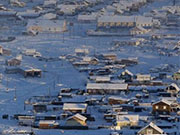

A bioanalyst checks a blood sample at the Salud Chacao Laboratory in Caracas, Venezuela, on Feb. 10, 2016. A total of 31 organizations announced Wednesday that they will share data and results relevant to the current Zika crisis and future public health emergencies as rapidly and openly as possible. (Xinhua/Boris Vergara)
WASHINGTON, Feb. 10 (Xinhua) -- Thirty-one organizations announced Wednesday that they will share data and results relevant to the current Zika crisis and future public health emergencies as rapidly and openly as possible.
Representatives for leading academic journals including Nature, Science and the New England Journal of Medicine, signed a joint declaration, along with funders such as the Bill and Melinda Gates Foundation and the Wellcome Trust, and research institutes such as the U.S. National Institute of Health and Chinese Academy of Sciences.
"We are committed to working in partnership to ensure that the global response to public health emergencies is informed by the best available research evidence and data," the joint declaration wrote.
All journal signatories of this agreement will make all content concerning the Zika virus free to access.
What's more, funder signatories will require researchers undertaking work relevant to public health emergencies to set in place mechanisms to share quality-assured interim and final data as rapidly and widely as possible, including with the World Health Organisation (WHO).
The move followed a consensus statement arising from a WHO consultation in September 2015, in which leading international stakeholders from multiple sectors affirmed that timely and transparent prepublication sharing of data and results during public health emergencies must become the global norm.
Jeremy Farrar, Director of the Wellcome Trust and a signatory of the joint declaration, said in a statement that research is an essential part of the response to any global health emergency.
"This is particularly true for Zika, where so much is still unknown about the virus, how it is spread and the possible link with microcephaly," Farrar said.
He added that rapid data sharing "will ensure that the knowledge gained is turned quickly into health interventions that can have an impact on the epidemic."
 |
Day|Week

 China releases HD true color images of lunar surface
China releases HD true color images of lunar surface To-be flight attendants undergo training at snow-covered field
To-be flight attendants undergo training at snow-covered field Aerial photos taken on J-11 fighter
Aerial photos taken on J-11 fighter 'Coldest town in China' — a fairyland you don't want to miss
'Coldest town in China' — a fairyland you don't want to miss Deep love for breathtaking Hainan
Deep love for breathtaking Hainan Beautiful Chinese tennis player Wang Qiang goes viral online
Beautiful Chinese tennis player Wang Qiang goes viral online Minus 71 degrees! Coldest village on earth
Minus 71 degrees! Coldest village on earth Chinese pole dancing master opens class in Tianjin
Chinese pole dancing master opens class in Tianjin The most beautiful town of snow in China
The most beautiful town of snow in China SWAT members hold romantic wedding in E China
SWAT members hold romantic wedding in E China